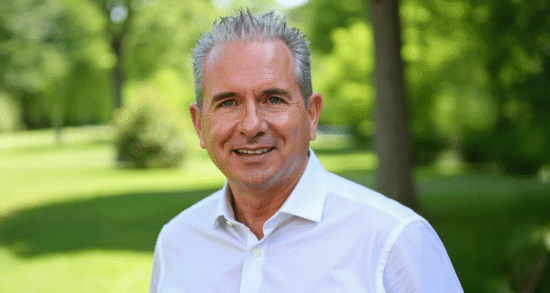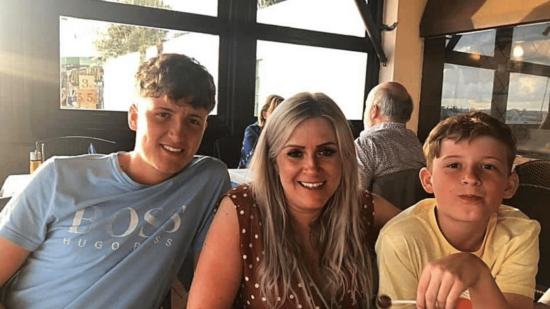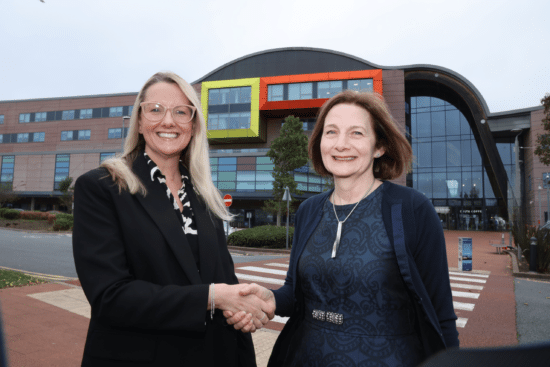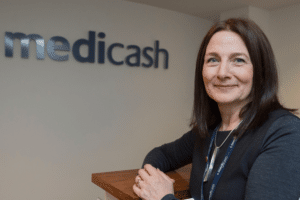
Tell us a little about yourself and your career background – where did you get started?
I began work here in Liverpool, under a training contract with an accounting firm – Cook & Co. It was based above British Home Stores, in a beautiful, but draughty, old office, with an internal open balcony and glass ceiling.
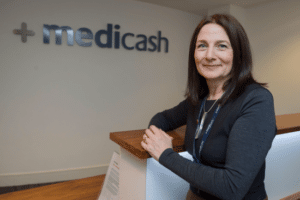
After completing my training, I worked for various accountancy firms. This period was an incredible start to my career, as every year I would work in over twenty different businesses, both large and small, preparing their accounts or working on their audit. Seeing what worked well and what didn’t, together with exposure to different leadership styles gave me a lifetime of experience within a short
space of time. Back then, accountants used to give advice to the client at the end of the job, highlighting how they could make improvements. That was a great grounding for me. Since then, I have always looked for ways to introduce efficiencies wherever I’ve worked and encourage colleagues to do this. Small improvements soon mount up to profound changes.
Next came a role in the Careers Service when they were about to tender to operate independently – outside the Council. This was a fascinating time, as after winning the contract we merged five different organisations. A few years later, I went to work at Merseyside Special Investment Fund (MSIF). We invested equity, loan or mezzanine funding, alongside banks and investors. The objective was to save and create jobs by supporting the employing firms and MSIF was very successful, with our funds growing from £20m to £143m while I was there.
This year, you’re celebrating 20 years at Medicash. What inspired you to join the company?
Someone suggested that I’d be a good fit for Medicash when I was ready for a change of direction – and I started here as Finance Director in January 2004.
Medicash appealed to me as it was in the health insurance sector, and I wanted to go home each night knowing that I’d played a small part in helping people with their health.
A parallel attraction was the Medicash Foundation. Supporting charities and the local community is now a prerequisite of successful firms as part of their Environmental, Social and Governance stance, but twenty years ago few businesses gave it much thought. A business with strong social values is rewarding for the wider community, but also extremely rewarding as an employee.
During those 20 years, we’ve seen some incredible milestones within the company. Do you have a moment you would consider your greatest achievement?
We have an understanding that when we interview, we ask ourselves, ‘is this person a ‘Medicash’ person?’ It’s hard to pinpoint what that means, but we all know when we see it.
Having a shared culture has been key to Medicash’s success, it’s something that came slowly. I would encourage leaders to promote their company’s values, as culture is your biggest strength – having a shared culture wasn’t a ‘moment’, exactly, but I’m proud that we reached it.
I’m also proud of just how much Medicash has grown in my years here. When I joined, we held fewer than 150,000 policyholders. This year, we’re looking to reach 600,000 and are now the UK’s largest corporate health cash plan provider.
Tell us how your vision and direction has impacted Medicash’s direction over the years.
When I became chief executive, Medicash was lacking direction. We had a scattergun strategic approach with no clear understanding of what we wanted to be and how we were going to achieve targets.
The key to this was in introducing a methodical approach of defining our values; simplifying our goals; and getting buy-in from all staff, which turned the business around. It was quite simple really. But we also can’t underestimate the impact of our investment, as we’ve focused very heavily on using technology to allow great access to healthcare for everyone, no matter their income or background. That’s key to our business identity.
You’ve developed the Medicash Foundation into a major aspect of the organisation, allowing us to do good beyond the scope of our products. What was your inspiration for this?
Working in a not-for-profit company offers freedoms that those working in companies with shareholders can’t enjoy. Working for shareholders means that you are obligated to earn profits for them, so they can take cash out of the business in the form of dividends. We don’t need to do this.
Our objective is to help our policyholders to enjoy a healthier life. In fact, we have the modest aim for our trading element to break even – this allows us to provide fantastic value to our policyholders.
Medicash was created by philanthropic individuals in Victorian Liverpool, donating their money to provide healthcare for the poor. I believe that it’s important to remember our roots and to build on this. These founders created an organisation to help people to look after their health; we now use some of our surpluses to feed back into the community to help people in need. I love the circular nature of the process. The Foundation is no longer a marginal part of Medicash, but an important part of who we are as a Group.
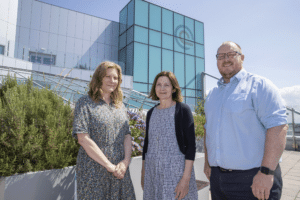
The Foundation’s board used to assess grant applications and decide which would be approved. Now, volunteers from among our staff make those decisions. We also accept applications from staff-nominated charities, and always share with our staff the extensive list of which charities and organisations we’ve supported and what they did with the grant.
The update on our charitable giving is always one of the most popular sections when we run staff briefings. We’re proud of the impact we have on our community.
Last year we launched our Medicash Nurses initiative. This was our biggest funding project to date, and is in the process of rolling out across various NHS trusts in the UK. The first of these was funding a new role within the Experimental Medicine Team at Clatterbridge Cancer Centre, right here in Liverpool – the nurse in this new role has already played a vital role in a number of clinical trials, as well as passing on their expertise to their fellow nurses and supporting better quality of care for cancer patients. That’s exactly what this initiative is all about.
What sort of challenges have you faced in your career, and how have you overcome them?
Often, I have been in the minority within boards – either by gender or by thought. Truthfully, my gender hasn’t given me too much trouble – I’ve found that if you have a good idea, it will be adopted if you can explain it sufficiently clearly. Over the years I worked on how to distil an issue down to its essence, and to find its best solution. This usually entails involving others and consulting fully. By focusing on the key aspects, listening, and collaborating with colleagues, the rest follows.
Today is International Women’s Day – would you say that being a woman has impacted your experiences within the finance and insurance sectors?
Attitudes have improved over the years. When I began, I came across the occasional prejudice as a woman, and often experienced being the only female, in a room full of men in grey suits.
The assumption that I was present in a meeting to take the minutes, when I was there as Chair, did niggle me. However, by quietly reinforcing my role and doing a good job, hopefully people no longer see my gender, but a person who’s prepared to work hard to have a positive impact.
Thankfully, the working environment has changed dramatically since I started work.
What are your goals for the future, whether Medicash or beyond?
To continue recruiting those with a good attitude at Medicash. Skills can be taught. Roles are constantly changing, so it’s imperative to continuously train staff so they have the skills to do their current jobs well, then trust them to carry out their roles.
And I will strive to keep listening and learning. I can’t know every aspect of the business – so know who I need to ask.
Continue to give credit where it’s due.
And to be positive. Positivity is infectious and people will take their lead from me. I strive for my staff to have good days at work and being happy in your job makes such a difference.
Finally – what advice would you give to young women aspiring to leadership roles like Chief Executive?
Don’t think that you must be the same as other leaders you may have encountered. Be you. Develop your own leadership style.
My nickname was ‘the mouse’ in my first job, as I was so shy. Networking and speaking to groups do not come easy to me, but I’ve worked on them to control my nerves. Play to your strengths, but know your weaknesses and work on them, so they are no longer weaknesses.
I’m a trustee at The Hive, in Birkenhead – a wonderful charity that provides a place for young people to learn new skills and to socialise in a safe space. One of their young people was telling me recently that when they first went to The Hive, they “hated everyone and everything”. They couldn’t speak to others as they had no self-confidence – but they were helped, learned to control their anger, and slowly gained the courage to make their voice heard. They are now at college, doing well and have developed into a pleasant young person. Incredibly they now speak publicly as an Ambassador for The Hive! When I heard them speak, they received several bouts of spontaneous applause during their talk – what an inspiration.
If you really want to improve something, work at it. You’ll always best achieve your goals through strong focus and hard work.

